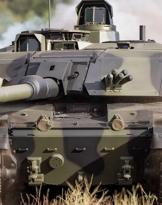Despite not officially fighting, the United States and Russia are shaping the Syrian battlefield by indirectly projecting (White House) and directly (Kremlin) its military power. Just in recent weeks, the American anti-tank missiles supplied to the Syrian rebels in the last two years, are playing a primary role in the entire armed context of the Region.
We know that the TOW missiles (acronym for Tube-launched Optically-tracked Wire-guided), were supplied by the United States and its allies to the Free Syrian Army and to the groups fighting against the government of Bashar al-Assad. At a cost of 12 / 15 thousand dollars per specimen, it is clear that this anti-tank equipment was part of the American standard equipment in support of the rebel troops.
The first (massive) use of TOWs dates back to last week, during the first ground offensive by government-backed Russian troops. The rebels, last Wednesday, published dozens of videos on the web that immortalize them while using US-made missiles against Russian tanks and armored vehicles belonging to the Syrian army. The rebels claim to have destroyed 24 vehicles, including tanks and armored vehicles, only on the first day of the offensive.
Although the American "train and equip" program has been suspended, the supply of equipment continues. And the reference to what happened in the 80 years, when hundreds of American Stinger missiles arrived in Afghanistan forever changing the fortunes of the conflict against the Soviet Union, is at least pertinent. In effect, a real proxy war between Washington and Moscow is taking place in Syria.
The TOW program, supervised by the CIA, is totally separate from the miserably failed Pentagon which, according to intentions, should have influenced the outcome of the other war waged in Syria, that in the north-eastern part of the country against the Islamic State. The CIA started the TOW program in the early months of the 2014, with the aim of countering Damascus by providing training, light weapons, ammunition and anti-tank missiles: tools that would prove essential to bridge the gap with the loyal government's heavy equipment.
 The missiles arrive in Syria from Saudi Arabia, upon supply from the CIA. The plan, as described by the Pentagon, aimed to exert sufficient military pressure against Assad's forces and convince him to a political compromise. A sort of "invitation" to the negotiating table, perhaps avoiding the collapse that would have unleashed chaos in the country. The entry of Russia, on the other hand, has upset the whole CIA strategy.
The missiles arrive in Syria from Saudi Arabia, upon supply from the CIA. The plan, as described by the Pentagon, aimed to exert sufficient military pressure against Assad's forces and convince him to a political compromise. A sort of "invitation" to the negotiating table, perhaps avoiding the collapse that would have unleashed chaos in the country. The entry of Russia, on the other hand, has upset the whole CIA strategy.
To date, it is impossible to determine whether the guided missiles in the hands of the rebels can really change the fortunes of the war as did the Stinger in the 80 years in the hands of the mujaheddin. It should be noted, however, that in Syria the Russians are entrusting the bombing to fighters and not helicopters (although for the first time they have been sighted near Hama, but after appropriate softening).
TOW missiles can slow the progress of the government, but certainly not block them. That's why in the past few hours, the rebels have asked the US for Stinger missiles to counter the new threat from the sky. And the problem is right here: Obama, in fact, vetoed the provision of this anti-aircraft platform for fear that it could fall into the hands of terrorists. No wonder: between the 30 and the 50% of the entire US supply provided to the Iraqis (for example) has fallen into the hands of the Islamic State without a shot being fired. And we are not just talking about light equipment: the Islamic State has "received" from tanks to heavy artillery.
The TOW program, however, will continue. Saudi Arabia has already confirmed its support (it is none other than the specular projection of the US) to the rebels. A clause in the program is also curious: the missiles are delivered in limited quantities. To receive supplies, the rebels must prove that they are in possession of the same delivered launchers. A clause, we don't know how much this can really work, to avoid that the systems can end up on the black market. Despite this, in at least two episodes, the al-Nusra front has shown that it has acquired American missiles, albeit in small numbers.
In 2013, Saudi Arabia purchased 13.975 anti-tank missiles, a fully delivered supply. By contract, the Saudi government must inform the United States of the final destination of the missiles. United States approval is implicit. The rules in Syria have now changed. The official versions of governments will not necessarily be the real ones, and indeed, these are precisely the main tools of proxy wars.
Putin, meanwhile, intervened yesterday evening on Russian state TV taunted the Americans, on the 500 million-dollar "train and equip" program, suspended and now considered a failure.
We also need Americans to win against terrorism - said Putin - but if they had given us those 500 million dollars, we would have used them better.
Finally, in the Pentagon they report that 50 tons of small-caliber ammunition have been dropped in northern Syria by four C-17 planes on Sunday night. They were all ammunition for M-16 and AK-47. The 50 tons of material have been parachuted into the Al-Hasakah province, home to Syrian, Arab, and an Assyrian minority community.
 (photo: web / image: Federation of American Scientists, Aircav.com and US Army)
(photo: web / image: Federation of American Scientists, Aircav.com and US Army)












